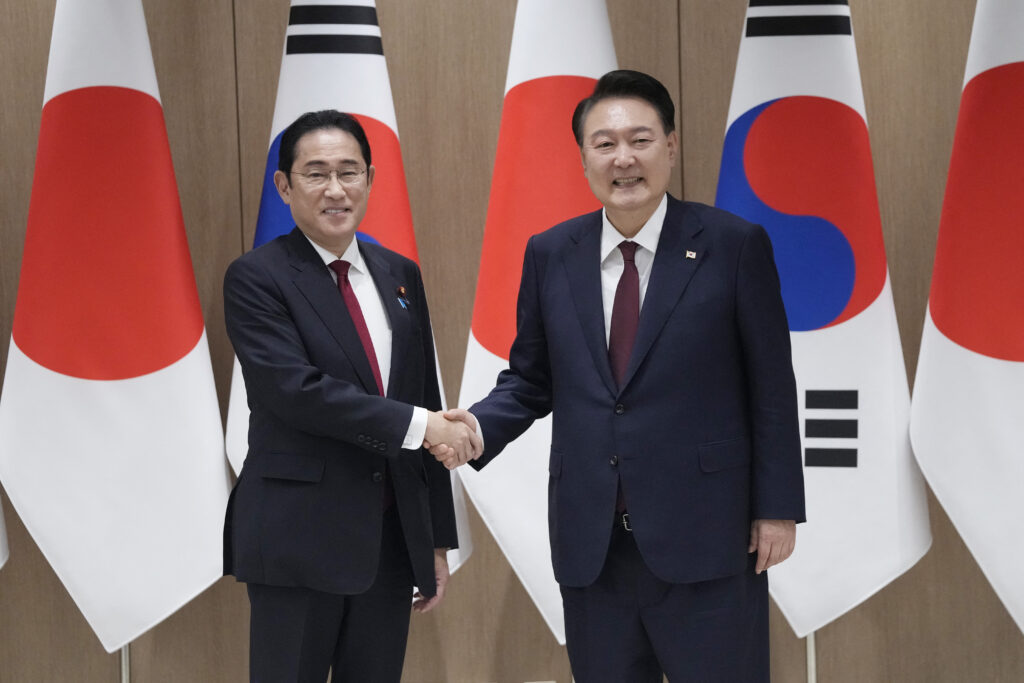
- ARAB NEWS
- 17 Aug 2025

TOKYO: When Japanese Prime Minister KISHIDA Fumio steps down next month, he will leave a legacy of improved Japan-South Korea ties and stronger defense capabilities.
On Wednesday, Kishida made a surprise announcement that he will not seek re-election in the ruling Liberal Democratic Party’s presidential race to be held in September, making way for a new leader.
Since becoming prime minister in October 2021, Kishida has managed to salvage Japan-South Korean relations from a point where the bilateral relationship was seen at a post-World War II low. He also began moves to drastically beef up Japan’s defense capabilities amid a tough security environment in the region.
Still, Kishida recently struggled with low public support for his cabinet, following revelations of the LDP’s ties with the controversial Unification Church religious group and slush funds at LDP factions.
Shortly after taking office, Kishida dissolved the House of Representatives, the lower chamber of Japan’s parliament, for a snap election. Held in October 2021, the poll ended with the LDP securing an absolute stable majority of 261 seats.
The LDP enjoyed a victorious outcome also in the July 2022 election for the House of Councillors, the upper chamber of the Diet, allowing Kishida to lay a stable foundation for his administration.
In the diplomatic and security fields, Kishida brought back bilateral mutual visits by national leaders with South Korean President Yoon Suk-yeol, who presented a solution for a long-standing bilateral dispute over wartime labor.
At a press conference Wednesday, Kishida said, “We must make the normalized Japan-South Korean ties an even more certain thing.”
With China’s hegemonic ambitions and North Korea’s nuclear and missile development in mind, Kishida made a huge shift in the country’s postwar security policy, allowing the Self-Defense Forces to possess counterstrike capabilities, or abilities to strike enemy missile bases.
Japan decided to increase its defense spending over the five years from fiscal 2023 to 43 trillion yen.
In the economic field, Kishida set a target of eradicating deflation and realizing wage hikes exceeding rising prices. In this year’s “shunto” spring labor-management negotiations, companies agreed an average increase of over 5 pct in monthly wages.
Meanwhile, the Kishida administration came under strong criticism from the public after some LDP members were found to have had close ties with the Unification Church, in the wake of the fatal shooting of former Prime Minister Shinzo Abe in July 2022.
Although his administration asked Tokyo District Court to order the religious group to disband and worked for the enactment of a bill on relief measures for victims of the Unification Church’s practices, the scandal left a deep scar on the administration.
With the Kishida cabinet already struggling to garner public support, the LDP factions’ money scandal was a nail in the coffin.
Accounting officials from an LDP faction once led by Abe and another faction headed by former Secretary-General Toshihiro Nikai were indicted over the political funds scandal. A former accounting head of Kishida’s faction was slapped with a summary indictment as well.
Kishida replaced cabinet ministers involved in the scandal and announced penalties for LDP lawmakers. But Kishida was not among those punished, resulting in grievances within the party.
Kishida’s announcement that he would dissolve his faction and his parliamentary handling of the LDP-sponsored bill to revise the political funds control law in the wake of the money scandal drove a wedge between him and two key figures supporting the administration, LDP Vice President Taro Aso and Secretary-General Toshimitsu Motegi.
With the current Lower House lawmakers’ term set to end in October 2025, the Kishida administration has been in a precarious position.
JIJI Press